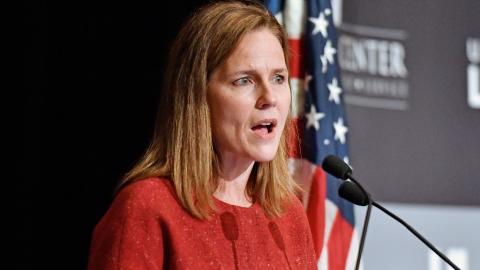Water Worries: CA Groundwater Mismanagement Puts Farmers and Food Supplies at Risk
After a historic wet winter, California's reservoirs and surface water are overflowing. However, state officials are in a race to prevent farmlands from becoming barren deserts as the state's groundwater is being pumped out at an alarming rate.
Depending on the source you read, California's "Golden State" nickname was coined because of the 1800's Gold Rush, the yellow poppies that sprout in Summer, or likely the early settlers who first saw its rolling-golden hills of parched grass.
"I think in California, we're almost perpetually in a drought," said Adam Claes with the Fresno Irrigation District (FID). "Over the past five years, we had the three driest years on record."
The state went from one of the worst droughts in more than 1,000 years to a record-breaking rain and snowpack. The entire state is virtually drought-free, for now. Water experts call this oscillating weather pattern the 'California Whiplash.'
"(Weather patterns) are swinging back-and-forth at a greater frequency and magnitude, largely due to an increase in temperature," said Paul Gosselin, deputy director for California's Department of Water Resources.
 Now that California has an abundance of surface water, the plan is to use and conserve it responsibly before the next drought inevitably comes.
Now that California has an abundance of surface water, the plan is to use and conserve it responsibly before the next drought inevitably comes.
The Gold Coast is America's largest agricultural producer, generating a third of the nation's vegetables and three-quarters of the fruits and nuts. The current water influx offers much-needed nurturing for local farms.
"Within FID, our biggest crops are almonds, grapes, and citrus," Claes said.
On the surface, much of California's reservoirs, lakes, and streams have been restored. Even the largest lake West of the Mississippi, Tulare Lake has refilled for the first time in 40 years after atmospheric river storms inundated California. Several counties have even banned water recreation due to flood water flowing from the Sierras, which could intensify as temperatures rise.
As for Fresno's Irrigation District, Claes expects about 4.5-million-acre feet of water to run off nearby Kings River, thanks to the extraordinary winter rain and snowfall. Still, only about half of that can be collected in underground basins and aquifers due to aging infrastructure and the unprecedented amount of water.
"On a year like this we're going to lose a lot of water out to the ocean, statewide, on every river system," Claes said. "We just don't have the infrastructure to contain it."
Experts, however, tell CBN News California's real problem is happening underground. Due to poor water management, the Gold Coast has one of the country's most over-drafted groundwater basins – meaning districts are using more groundwater than they should.
"It's almost like balancing your checkbook," Gosselin explained. "We've been spending a little too much money every month."
Groundwater levels have been plummeting in some regions for over a century. Dry years force farms and cities to rely so much on groundwater – in some cases, wells run dry, and the ground physically sinks. Projections estimate vast amounts of farmland could become worthless in the next 20 years.
"One of the reports that came out – (estimates) half-a-million to a million acres in the San Joaquin valley will go out of production," said Gosselin.
Claes worries the impact could be widespread.
"If land becomes fallowed in California, that means there's less food being grown, and we are the breadbasket of the world," explained Claes.
It doesn't help that in 2014, California became the last state to pass the Sustainable Groundwater Management Act. It forces agencies like Fresno's irrigation district to reach groundwater sustainability in 20 years or face dire consequences.
"Fresno Irrigation District is in a critically over-drafted groundwater basin – which means if you draw a trend line over the last 100 years, groundwater levels have continuously declined," said Claes.
Most districts are rushing to prepare for the next drought by collecting surface water underground using a system called groundwater recharge.
"I'm standing in front of a canal, one of the 350 miles we have of canals, that will distribute water to farmers, cities, and recharge basins," Claes said.
***Please sign up for CBN Newsletters and download the CBN News app to ensure you keep receiving the latest news from a distinctly Christian perspective.***
As the water flows through, it sinks beneath layers of sediment, supplying nearby water basins for storage. However, farms outside the reach of California irrigation districts are unable to access water being collected – sparking fierce litigation regarding access to water. According to a 2019 report by the Natural Resources Defense Council, there were over 1,200 water rights lawsuits pending in California courts at that time. The report also found that the number of water rights lawsuits has been increasing in recent years due to the state's growing population and the increasing severity of droughts.
Erik Ekdahl with the State Water Resources Control Board says California will continue to see its groundwater decline as the population and temperatures increase.
"I think these droughts and wet periods have made us realize we need to understand it at a new level," Ekdahl said.
As wells run dry in different parts of the state, it's a race against the clock to figure out how to manage this most precious resource.
"I'm absolutely confident that we're on the right track to get to groundwater sustainability," Gosselin said. "It's not going to be easy – there will be bumps in the road, conflict – but everyone is going the same direction and we're going to get there."




